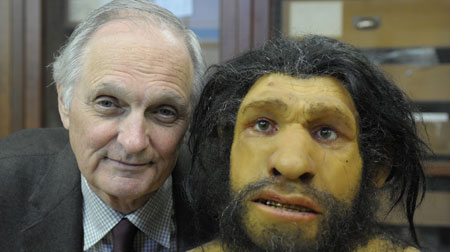In the caves of the Dordogne region of France, host Alan Alda witnesses the spectacular paintings and carvings that date back some 30,000 years, artwork that archeologists once thought to be the first record of people with minds like ours. When this art was created, Europe had already been peopled for hundreds of thousands of years by Neanderthals.
 VIEW LARGER The Human Spark-Neanderthal
VIEW LARGER The Human Spark-Neanderthal
Alan Alda and a Neanderthal
Alda discovers, from visits to sites where Neanderthals once lived, that they were tenacious and resourceful, but they produced no art and employed a stone tool technology that changed little over millennia. The people who painted the caves, our ancestors, were strikingly different, possessed of the “human spark,” capable not only of art but of innovative technology and symbolic communication. Alda asks: Where and when did the human spark first ignite? In these caves, as archeologists have long believed? Or at a much earlier time — and on another continent?

By submitting your comments, you hereby give AZPM the right to post your comments and potentially use them in any other form of media operated by this institution.